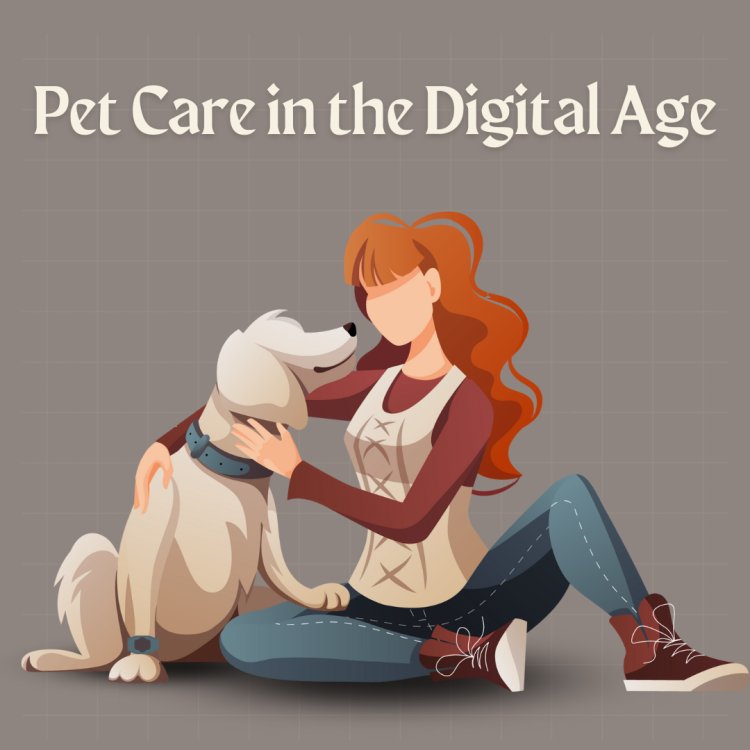Pet Care in the Digital Age: Exploring the Benefits of Digital Health Tools for Pets
In this blog, we will explore the various ways digital health tools are revolutionizing pet care and helping our furry friends live longer and happier lives.

Digital health tools have emerged as a game-changer in the field of veterinary care, empowering pet owners and veterinarians alike. The COVID-19 pandemic has further highlighted the need for remote monitoring and advanced technologies to ensure the well-being of our beloved pets. With the increasing adoption of digital solutions in veterinary medicine, pet owners can now actively manage their pets' health and provide them with the best possible care.
The Global veterinary Telehealth for Pets market was valued at USD 119.6 million last year. It is expected to grow at a compound annual rate (CAGR of 17.6%) from this year to 2030. Experts believe the increasing adoption of these management systems is linked to the increased focus on veterinary health and smarter disease detection.

- Tracking Health in Real-Time: Wearable devices have become a popular choice among pet owners, providing continuous monitoring of vital parameters such as body temperature, heart rate, respiration rate, and pH levels. These devices offer real-time insights into a pet's health, allowing owners to proactively address any concerns. Additionally, wearable trackers equipped with GPS technology provide an invaluable tool for locating lost pets. Remote monitoring through smart harnesses and collars, such as the PetPace smart collar and VetGuardian platform, enables pet owners to track their pet's vital signs from afar. These advancements in wearables ensure that pet health is closely monitored, even in the absence of physical proximity.
- 3D Printing: Enhancing Mobility for Pets: Similar to human healthcare, 3D printing has found its way into veterinary medicine, providing customized solutions for pets requiring prosthetics or orthotics. Innovative 3D modeling software enables the creation of bespoke prosthetics tailored to each animal's unique needs. Dogs, cats, horses, and other pets can now regain their mobility and improve their quality of life with the help of 3D-printed prosthetics. This technology not only benefits pets but also provides emotional support to their owners, giving them peace of mind knowing their furry companions can lead fulfilling lives.
- Digital Tech for Vets: Streamlining Veterinary Care: Digital technologies are reshaping veterinary practices, allowing veterinarians to provide more efficient and personalized care. Veterinary clinics are adopting patient information management systems to track an animal's well-being, manage vaccinations, and securely store important medical data. Smartphone apps facilitate seamless communication between veterinarians and pet owners, enabling convenient access to medical records and post-surgical management. Telemedicine is gaining prominence, providing virtual consultations and improving accessibility to veterinary care. Vets are also embracing artificial intelligence (AI) to enhance administrative tasks, aid in medical imaging analysis, and improve decision-making. While AI may not be able to decipher the language of cats, its potential in supporting veterinary diagnostics and treatment is promising.
For digital health tools to reach their full potential in veterinary care, veterinarians must adapt and embrace these technologies. This cultural transformation requires veterinarians to enhance their digital literacy, become proficient in utilizing new equipment, and effectively communicate with clients in virtual spaces. As in human healthcare, veterinarians need to stay abreast of advancements and continually update their skills to provide the best possible care for their animal patients. Digital health tools have revolutionized veterinary care, enabling pet owners to actively participate in managing their pets' health and well-being. Wearables, remote monitoring, 3D printing, and digital technologies for veterinarians have all contributed to improved health outcomes and enhanced quality of life for pets. As the field continues to evolve, the future of veterinary care holds great promise, with the potential for further advancements in AI, remote care, and personalized treatment options which will be able to provide more comprehensive and advanced care to our furry friends. By embracing digital health solutions, we can ensure that our pets live longer, healthier, and happier lives.












